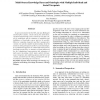WEBI
2005
Springer
14 years 5 months ago
2005
Springer
Given the large heterogeneity of the World Wide Web, using metadata on the search engines side seems to be a useful track for information retrieval. Though, because a manual quali...
WEBI
2005
Springer
14 years 5 months ago
2005
Springer
Collaborative filtering techniques are widely used by many E-commerce sites for recommendation purposes. Such techniques help customers by suggesting products to purchase using o...
WEBI
2005
Springer
14 years 5 months ago
2005
Springer
We profile a system for search and analysis of largescale email archives. The system builds around four facets: Content-based search engine, statistical topic model, automaticall...
WEBI
2005
Springer
14 years 5 months ago
2005
Springer
Distributed Perception Networks (DPN) are a MAS approach to large scale fusion of heterogeneous and noisy information. DPN agents can establish meaningful information filtering c...
WEBI
2005
Springer
14 years 5 months ago
2005
Springer
Web services have emerged as a new paradigm that supports loosely-coupled distributed systems in service discovery and service execution. Next generation web services will evolve ...
WEBI
2005
Springer
14 years 5 months ago
2005
Springer
In recent years, many research systems have been proposed to perform data extraction and automation tasks on Web sources. Since most of today’s Web sources are “human-readable...
WEBI
2005
Springer
14 years 5 months ago
2005
Springer
Several algorithms based on link analysis have been developed to measure the importance of nodes on a graph such as pages on the World Wide Web. PageRank and HITS are the most pop...
WEBI
2005
Springer
14 years 5 months ago
2005
Springer
In open environments like the Web, and open Multiagent and Peer2Peer systems, consent among the autonomous, self-interested knowledge sources and users very often cannot be establ...
WEBI
2005
Springer
14 years 5 months ago
2005
Springer
Due to the enormous size of the web and low precision of user queries, finding the right information from the web can be difficult if not impossible. One approach that tries to ...
WEBI
2005
Springer
14 years 5 months ago
2005
Springer
A novel web surfer model, where the transitions between web pages are fuzzy quantities, is proposed in this article. Such a model is appropriate when the links between pages are i...

